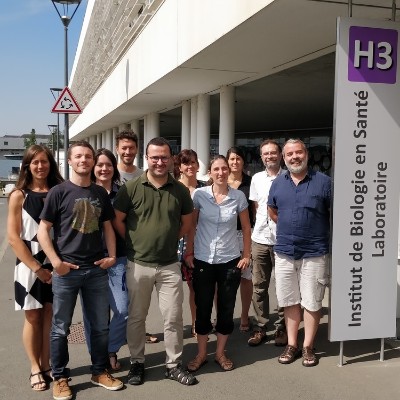- Index
- >ANR & INCA funded projects
- >CarboMIC (2019-2023)
CARBOMIC: An ANR funded project for Dr Brice Calvignac Research
This research project directed by Dr Brice Calvignac is granted by the French Research Agency (ANR) for the coming 4 years.
Resistance to traditional antimicrobial therapies is a rapidly increasing problem that in a few years could make infections impossible to treat and bring the state of medical care back to the pre- antibiotic era from the beginning of the last century. Indeed, the extensive use of antimicrobials worldwide (such as antibiotics) during the last decades has led to the apparition of a growing multiresistance phenomenon. Hence, if the strategy of combating infections is not significantly changed in the coming years, the problems related to resistant bacteria will escalate even further. At the same time, medicine faces many technological shortcomings that the development of new therapeutic systems tries to overcome, as Drug Delivery Systems (DDS) which unmistakably took an important place in human therapeutics. As a result, developing new effective antimicrobial compounds and alternative treatments is now a real issue and an important part of the European action plan against the rising threats from antimicrobial resistance. During the last decades, DDS revealed essential in human therapeutics. DDS are obtained by the effective encapsulation of drugs in carriers allowing a safe and efficient controlled delivery in the body. Therefore, it is necessary to develop formulation processes which are green, flexible, and respectful of Good Manufacturing Practices. The project challenge is to develop a sustainable continuous process producing nanocomplexes (NC) and biocompatible particles for antimicrobials delivery as Antibiotics or Antimicrobial peptides (AMP). The project team expertise and its complementarity provide the capacity to cover all the necessary competencies to develop such an innovative drug product. The innovation of the CarboMIC project is to develop the Galenic-on-chip concept leading to the production of carriers and allowing the integration of ex situ and in situ physicochemical characterization close to the final product. Moreover, the proposed approach will allow fine control of the physicochemical characteristics of drug carriers (size, structure, surface properties, drug loading), depending on the geometry of the microreactor and hydrodynamics of the process. Besides on longer terms thanks to the use of a microfluidic device, it could be expected an easy scale-up at industrial- scale of this innovative antimicrobial carrier production. In this way, the eco-design methodology will be deployed far upstream during the development of the encapsulation process. Finally, full physicochemical and biological characterization of the Antimicrobial-NC carriers will be carried out to tune their functionalities to improve their therapeutic potential on the infected site and to choose the local administration route which is the most suitable.



